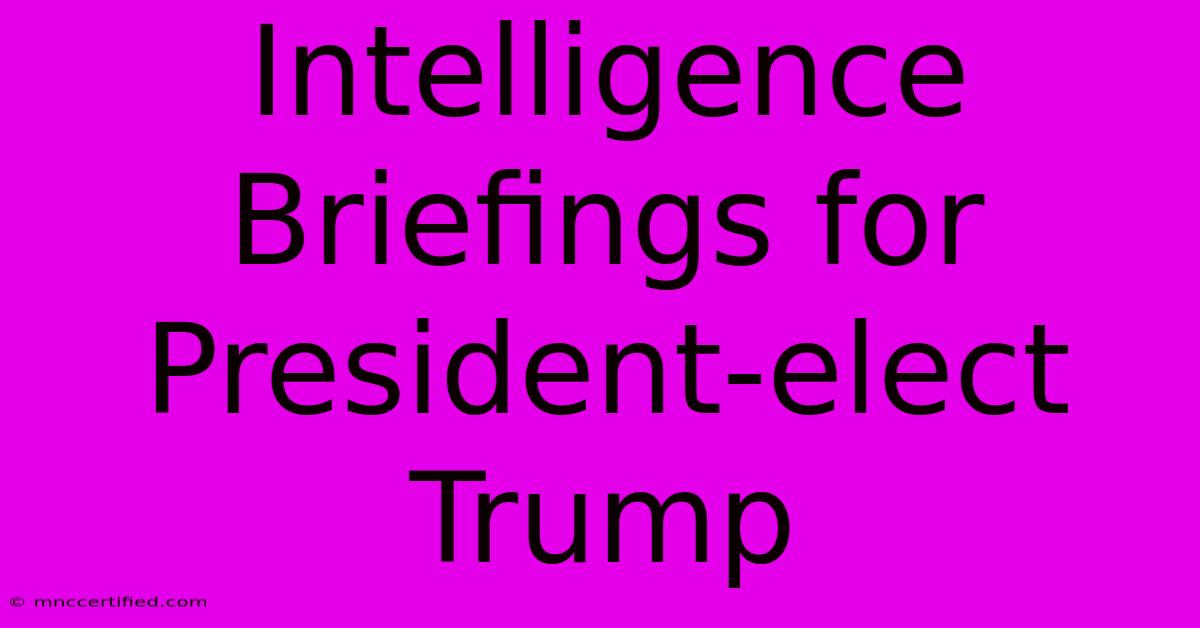Intelligence Briefings For President-elect Trump

Table of Contents
Intelligence Briefings for President-elect Trump: A Comprehensive Overview
The transition of power in the United States is a complex process, and a crucial element is the intelligence briefing received by the president-elect. The briefings given to President-elect Donald Trump in 2016 were particularly noteworthy, marked by both unprecedented access and considerable controversy. This article delves into the nature of these briefings, their significance, and the challenges they presented.
Understanding Presidential Intelligence Briefings
Presidential Daily Briefs (PDB), or intelligence briefings, are highly classified documents summarizing the most critical intelligence assessments for the President. These briefings cover a wide range of national security issues, including:
- Terrorism: Threats from domestic and international terrorist groups.
- Cybersecurity: Threats to national infrastructure and data security.
- Foreign Policy: Developments in global relations, including diplomatic efforts and potential conflicts.
- Economic Issues: Analysis of global and national economic trends impacting national security.
- Military Matters: Updates on military operations and deployments.
The goal is to provide the President with a concise, actionable overview of the most pressing intelligence concerns, allowing for informed decision-making. The briefings are tailored to the President's needs and interests, adapting to evolving circumstances.
The Trump Transition and Intelligence Briefings: Unique Challenges
The briefings provided to President-elect Trump presented unique challenges. Several factors contributed to this:
- Trump's Unprecedented Access: While the practice of providing briefings to president-elects is standard, the extent and frequency of briefings provided to Trump during the transition period were subject to scrutiny.
- Trump's Public Statements: Trump's frequent public comments about the briefings themselves, and his occasional dismissal of intelligence assessments, raised concerns about the integrity and confidentiality of the process. This was a departure from the traditional discretion surrounding these sensitive matters.
- Concerns about Leaks: The potential for leaks concerning the content of the briefings was a significant concern, further highlighting the sensitive nature of the information shared.
- Relationship with the Intelligence Community: Trump's often strained relationship with elements of the intelligence community, particularly during and after the transition, created a complex dynamic that impacted the effectiveness of the briefings.
Specific Concerns and Controversies
Several specific aspects of the briefings to President-elect Trump garnered significant attention:
- The Steele Dossier: The infamous Steele dossier, a collection of unverified intelligence alleging links between the Trump campaign and Russia, became a major point of contention. Its inclusion in or discussion during the briefings fueled debate about the reliability of intelligence sources.
- Russia's Interference in the Election: Intelligence assessments regarding Russian interference in the 2016 US presidential election formed a crucial part of the briefings. Trump's responses to these assessments added to the controversy.
- Sources and Methods: The delicate balance of protecting intelligence sources and methods while providing the president-elect with necessary information posed a significant challenge. Public scrutiny of these processes raised concerns about national security.
The Importance of Continuity and Transparency
The intelligence briefings provided to President-elect Trump highlight the critical importance of maintaining continuity in the transfer of power. A well-informed president is essential for national security. While secrecy is necessary to protect sources and methods, a certain degree of transparency is crucial for public trust and accountability.
The events surrounding the briefings served as a case study in the complexities of the presidential transition and the relationship between the executive branch and the intelligence community. They underscored the need for careful consideration of how sensitive information is handled during this crucial period, ensuring both the safety of national secrets and the informed decision-making of the incoming president.
Conclusion: Lessons Learned
The experience of providing intelligence briefings to President-elect Trump offered valuable lessons. These include the importance of clear communication, managing public expectations regarding intelligence assessments, and fostering a trusting relationship between the incoming administration and the intelligence community. These factors are crucial for ensuring the smooth and effective transfer of power and maintaining national security. Future presidential transitions should strive for a balance between maintaining confidentiality and ensuring transparency to maintain public confidence and bolster the integrity of the intelligence process.

Thank you for visiting our website wich cover about Intelligence Briefings For President-elect Trump. We hope the information provided has been useful to you. Feel free to contact us if you have any questions or need further assistance. See you next time and dont miss to bookmark.
Featured Posts
-
Livestock Gross Margin Insurance
Nov 22, 2024
-
Top Qb Recruit Joins Colorado
Nov 22, 2024
-
Who Takes Delta Vision Insurance
Nov 22, 2024
-
Laos Methanol Poisoning Another Tourist Dead
Nov 22, 2024
-
Richard Coles Joins I M A Celeb
Nov 22, 2024